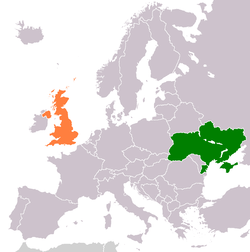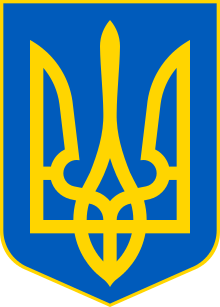Ukraine–United Kingdom relations
 |
|
Ukraine |
United Kingdom |
|---|---|
Ukraine – United Kingdom relations, or British–Ukrainian relations, are foreign relations between Ukraine and the United Kingdom.
The acting Ukrainian ambassador to the United Kingdom is Andrii Kuzmenko,[1] and the British ambassador to Ukraine is Simon Smith who took up his post in September 2012.[2]
Country comparison
| |
| |
|---|---|---|
| Population | 44,291,413 | 64,105,654 |
| Area | 603,500 km2 (233,013 sq mi) | 243,610 km2 (94,060 sq mi ) |
| Population Density | 73/km2 (191/sq mi) | 255.6/km2 (661.9/sq mi) |
| Capital | Kiev | London |
| Largest City | Kiev – 2,847,200 (3,275,000 Metro) | London – 8,174,100 (14,709,000 Metro) |
| Government | Unitary semi-presidential constitutional republic | Unitary parliamentary constitutional monarchy |
| Official language | Ukrainian (de facto and de jure) | English (de facto) |
| Main religions | 62.5% non-Religious, 33.6% Christianity, 0.6% Islam, 3.3% Other | 59.4% Christianity, 25.7% Non-Religious, 7.8% Unstated, 4.4% Islam, 1.3% Hinduism, 0.7% Sikhism, 0.4% Judaism, 0.4% Buddhism (2011 Census) |
| GDP (per capita) | $8,668 | $42,511 |
| GDP (nominal) | $130.7 billion | $3.056 trillion |
History
After World War II, work-permit schemes issued under the Attlee government (in office: 1945-1951) recruited Ukrainians to work in the mills of Lancashire and in the greenhouses of the Lea Valley (Middlesex/Essex). Large numbers of Ukrainians (mainly displaced persons from camps in Germany) arrived in the UK. Ukrainians were integrated into the UK as European Voluntary Workers, while Ukrainian POWs from the Polish and German armies were also demobilised and settled in the major cities of the UK.
Prime Minister Margaret Thatcher visited Ukraine in June 1990 when it was part of the Soviet Union.
Ukrainian Independence
After Ukrainian Independence from the Soviet Union in August 1991, diplomatic relations between Ukraine and the United Kingdom were established on 10 January 1992. Ukraine opened an Embassy in London in October 1992 and a Consulate General in Edinburgh in February 2002. The UK Consulate-General in Kiev opened in November 1991 and became the Embassy in January 1992.[3]
Until 2005, the Presidents of Ukraine twice paid visits to the UK − in February 1993 and December 1995. The Prime Minister of the United Kingdom visited Ukraine in April 1996. The intensity of bilateral contacts at all levels boosted during 2008-2009. In particular, the President of Ukraine Victor Yuschenko visited the UK three times: in May, October 2008 and January 2009. As the result of the visit in May 2008, the Joint Statement that officially declared the strategic nature of Ukrainian-British relations was issued.[4]
2014 Ukrainian revolution and Pro-Russian unrest
.jpg)
Relations between the United Kingdom and Ukraine are currently very close,[5] there are regular bilateral visits between the countries and political dialogue covers the full range of international issues.[5]
Since the beginning of the Ukrainian revolution and Pro-Russian unrest in Ukraine the United Kingdom has actively supported Ukraine and publicly condemned Russian actions. The UK supports Ukraine in becoming a member of the EU and NATO.[5][6] In this context London has implemented a series of sanctions and restrictive measures both in unilateral and multilateral formats.
Since the beginning of 2014 the following meetings have taken place: the meeting between Prime Minister of Ukraine Arseniy Yatseniuk and British Foreign Secretary William Hague during the FS visit to Ukraine (3 March), Prime Minister Arseniy Yatseniuk’s meeting with UK Prime Minister David Cameron on the sidelines of the EU Summit in Brussels (6 March); meeting between the President of Ukraine Petro Poroshenko with the UK Prime Minister David Cameron during the commemorations of 70th anniversary of the Normandy landings, as well as a number of meetings at the level of foreign ministers of the two countries (3 March, 7 May, 23 June).[7]
Cultural and economic relations
The United Kingdom is a major trade partner of Ukraine, it is the fifth largest investor in Ukraine.[8]
The 2001 Census recorded 11,913 people born in Ukraine resident in the UK.[9] A large number of Ukrainians living in Britain are Ukrainian Catholics, under the jurisdiction of the Ukrainian Catholic Eparchy of the Holy Family of London, whilst many other Ukrainian Britons are Jews.
Twinnings
-
 Peterborough and
Peterborough and  Vinnytsia
Vinnytsia -
 Rochdale and
Rochdale and  Lviv
Lviv -
 Liverpool and
Liverpool and  Odessa
Odessa -
 Barnsley and
Barnsley and  Horlivka
Horlivka -
 Sheffield and
Sheffield and  Donetsk
Donetsk -
 Cardiff and
Cardiff and  Luhansk
Luhansk
See also
- Foreign relations of Ukraine
- Foreign relations of the United Kingdom
- Ukrainian diaspora in the United Kingdom
External links
- Ukrainian Embassy in London
- Ukrainian Embassy in London Facebook Page
- Ukrainian Embassy in London Twitter Page
- British Foreign and Commonwealth Office about the relations with Ukraine
- British embassy in Kiev
- Joint Statement by Prime Minister Gordon Brown and President Victor Yushchenko
References
- ↑ "Andrii Kuzmenko". Embassy of Ukraine to the United Kingdom. Retrieved 23 November 2014.
- ↑ Change of Her Majesty’s Ambassador to Ukraine – Foreign & Commonwealth Office press release, 13 October 2011
- ↑ "Political issues between Ukraine and Great Britain". Embassy of Ukraine to the United Kingdom. Retrieved 23 November 2014.
- ↑ "Political issues between Ukraine and Great Britain". Embassy of Ukraine to the United Kingdom. Retrieved 23 November 2014.
- 1 2 3 Political relations
- ↑ Joint Statement by Prime Minister Gordon Brown and President Victor Yushchenko
- ↑ "Political issues between Ukraine and Great Britain". Embassy of Ukraine to the United Kingdom. Retrieved 23 November 2014.
- ↑ Country Profile: Ukraine
- ↑ "Country-of-birth database". Organisation for Economic Co-operation and Development. Retrieved 2008-12-03.

